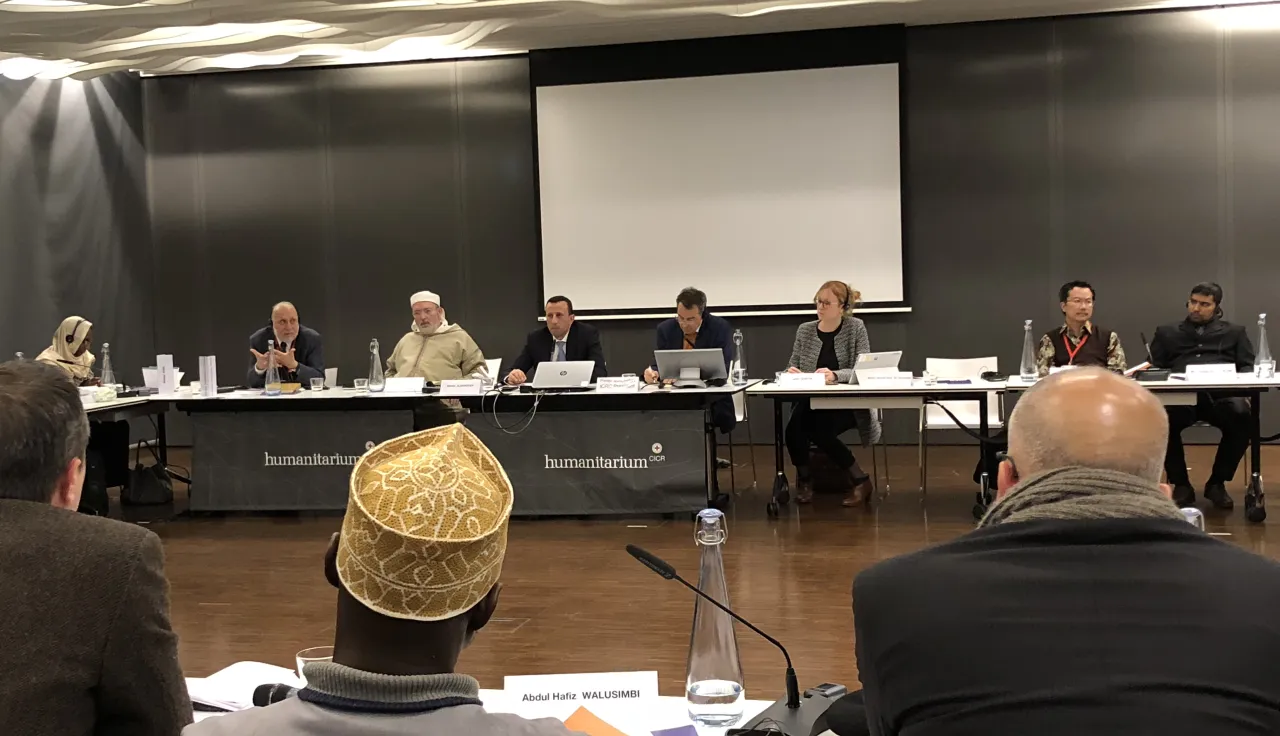The ICRC has acknowledged the importance of understanding the Islamic laws of war since the 1950s, and has actively engaged with Islamic institutions and scholars since the 1990s.
At present, about two-thirds of the ICRC's operations are in Muslim countries where armed conflicts are in progress; the ICRC allocates a similar proportion of its budget to these operations.
In these contexts, Islamic law can provide useful references and insights to help protect people affected by conflict. These videos were taken during the first global expert workshop on IHL and Islamic law in contemporary armed conflicts took place in Geneva, at the headquarters of the International Committee of the Red Cross (ICRC), organized by the Advisory Service on IHL from 29 to 30 October 2018.
Experts from 23 countries took part in the workshop, where they discussed five subjects of contemporary concern:
1) the conduct of hostilities;
2) protection for health-care personnel and facilities;
3) detention during armed conflict;
4) special protection for children;
5) the proper handling of dead bodies.
Participants considered the subjects mentioned above from the perspectives of IHL, Islamic law, and operational expertise.
Do IHL and Islamic law contradict one another? — Lecturer in Islamic law and IHL, president of the University of Comoros
There is no contradiction. If there is no contradiction in the objective, there is no contradiction in the means, but only variety.
Said Bourhani - .
Special protection for children — Lecturer at Zeytouna University, Tunisia
People have differed over the age of maturity; however, some scholars place it at 15 years and others at 18. Before this age, children are banned from joining armed conflicts.
Handling the deceased with dignity — Kenan Musić - Professor at the Faculty of Islamic Studies and head Imam for Sarajevo, Bosnia and Herzegovina
Dead bodies in Islamic tradition and in Islamic law should be treated with the highest respect regardless if the person is a Muslim or non-Muslim.
Attacks on religious sites? — Mohamed Abdelsamed Mohamed Mahana - Professor of international law at al-Azhar University and adviser to the Grand Imam of al-Azhar for foreign relations and international cooperation, Egypt
What does Islamic law say about attacks on religious sites? There is a need to defend monasteries and churches despite them being places of worship for religions other than Islam.
Treatment of the sick and wounded — Muhammad Nuruddeen Lemu – Director of research and training at the Da'wah Institute of Nigeria, Nigeria
For the sick and wounded whether they are our people whether they belong to other people, they belong to the category of people who need to be shown compassion and it's our responsibility to do whatever we can do to help the sick.
Protection of civilians and civilian property — Sohail H. Hashmi - Professor of international relations at Mount Holyoke College, United States of America
In Islamic law Muslim fighters can only target those who are fighting them, and they have an obligation to do as much as they can to protect those who are not fighting. The enemy's property is to be protected unless there is a direct military need for the destruction of their property, and this principle is common to just about every military ethical system that we can find in the world.
Protecting healthcare workers? — Fassi Fihri Driss - Professor and vice-president of al-Qarawiyyin University, Morocco
What is the ground for protecting healthcare workers under Islamic law? Healthcare workers belong to the category of those granted the pledge of protection.
Treatment of detainees — Sheikh Ahmad Abadi Abed Al-Sadah Mohammad Al-Shibani - Instructor at Baghdad's al-Hawza al-Ilmiyya, Iraq
Prisoners of war must be dealt with in a purely humanitarian way, which means giving them our food, drink and lodging.
On the importance of the topic — Marco Sassòli - Director of the Geneva Academy of International Humanitarian Law and Human Rights and Professor of International Law at the Faculty of Law of the University of Geneva, Switzerland
So, the main problem is both for Islamic Law and for Humanitarian Law, how to get a better respect of the rules which are uncontroversial. The rules, the principles which are the most important thing are the same.
Watch more videos of the workshop on IHL and Islamic Law
- Special protection for women
- Special protection for children
- About the use of weapon of mass destruction?
- Special protection for children under Islamic law
- Do IHL and Islamic law contradict one another?
- Treatment of the sick and wounded
- Main similarities between IHL and Islamic law
- Handling dead bodies with dignity
- Attacks on religious sites?
- Main similarities between IHL and Islamic law (II)
- Main similarities between IHL and Islamic law (III)
- What is the ground for protecting healthcare workers?
- Protection of humanitarian aid workers
- Treatment of the sick and wounded (II)
- Protection of civilians and civilian property
- Protection of civilians and civilian property (II)
- On the importance of the topic (French)
See more:
Read the article on the First global expert workshop on IHL and Islamic law in contemporary armed conflicts
The report on the Experts' Workshop on IHL and Islamic Law in Contemporary Armed Conflicts




